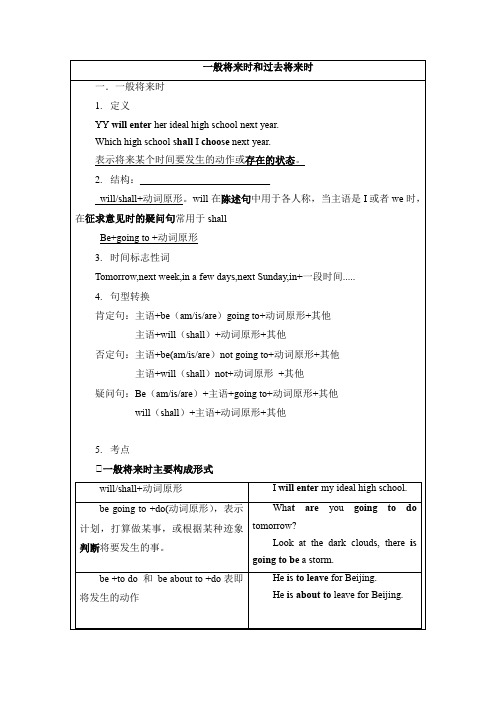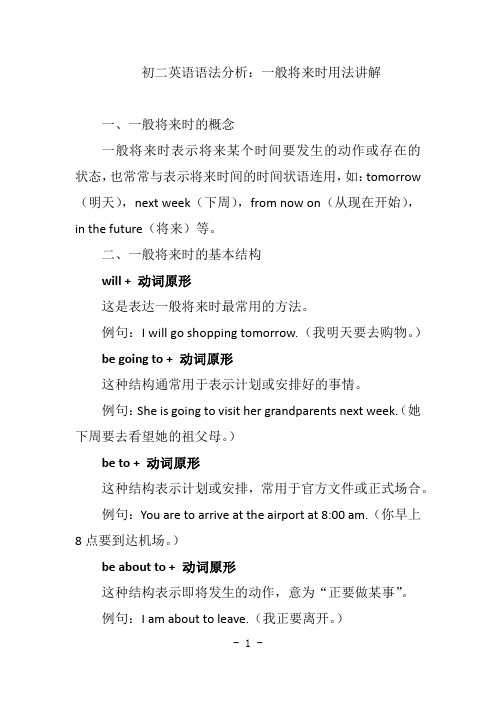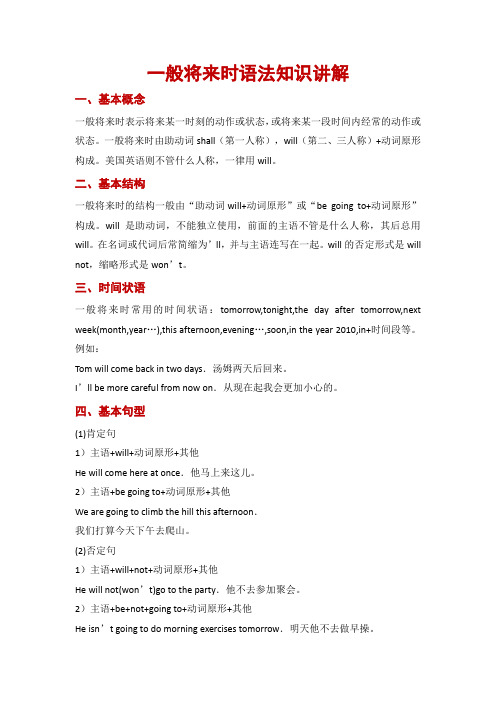初中英语一般将来时专项语法讲解资料
中考英语一般将来时和过去将来时专项讲解

一般将来时和过去将来时一.一般将来时1.定义YY will enter her ideal high school next year.Which high school shall I choose next year.表示将来某个时间要发生的动作或存在的状态。
2.结构:__________________________will/shall+动词原形。
will在陈述句中用于各人称,当主语是I或者we时,在征求意见时的疑问句常用于shallBe+going to +动词原形3.时间标志性词Tomorrow,next week,in a few days,next Sunday,in+一段时间.....4.句型转换肯定句:主语+be(am/is/are)going to+动词原形+其他主语+will(shall)+动词原形+其他否定句:主语+be(am/is/are)not going to+动词原形+其他主语+will(shall)not+动词原形+其他疑问句:Be(am/is/are)+主语+going to+动词原形+其他will(shall)+主语+动词原形+其他5.考点①一般将来时主要构成形式will/shall+动词原形I will enter my ideal high school.be going to +do(动词原形),表示计划,打算做某事,或根据某种迹象判断将要发生的事。
Wha t are you going to do tomorrow?Look at the dark clouds, there is going to be a storm.be +to do 和be about to +do表即将发生的动作He is to leave for Beijing.He is about to leave for Beijing.He is leaving for Beijing.Be+doing表将来(come,go,leave,start等瞬间动词)翻一翻我将会待在这个漂亮的城市。
初二英语语法分析--一般将来时用法讲解

初二英语语法分析:一般将来时用法讲解一、一般将来时的概念一般将来时表示将来某个时间要发生的动作或存在的状态,也常常与表示将来时间的时间状语连用,如:tomorrow (明天),next week(下周),from now on(从现在开始),in the future(将来)等。
二、一般将来时的基本结构will + 动词原形这是表达一般将来时最常用的方法。
例句:I will go shopping tomorrow.(我明天要去购物。
)be going to + 动词原形这种结构通常用于表示计划或安排好的事情。
例句:She is going to visit her grandparents next week.(她下周要去看望她的祖父母。
)be to + 动词原形这种结构表示计划或安排,常用于官方文件或正式场合。
例句:You are to arrive at the airport at 8:00 am.(你早上8点要到达机场。
)be about to + 动词原形这种结构表示即将发生的动作,意为“正要做某事”。
例句:I am about to leave.(我正要离开。
)be due to + 动词原形这种结构表示某事预定或预期将要发生。
例句:The train is due to arrive at 5:00 pm.(火车预定下午5点到达。
)三、一般将来时的用法1表示将来的动作或状态例句:I will buy a new car next year.(明年我要买一辆新车。
)2表示将来的计划或安排例句:We are going to have a picnic this weekend.(我们这个周末要去野餐。
)3表示根据现有情况推测未来的可能性例句:It's going to rain soon.(很快就要下雨了。
)4表示命令、请求、建议等例句:You are to finish your homework before you go out.(你出去之前要把作业做完。
一般将来时态精讲

一般将来时态精讲TPMK standardization office TPMK5AB- TPMK08- TPMK2C- TPMK18一般将来时态精讲(一)一般将来时(de)定义一般将来时表示将来某个时间所发生动(de)作或存在(de)状态,也可表示将来经常或反复发生(de)动作,经常与表示将来(de)时间状语连用, 如:soon, tomorrow,next week, in a few days等.例如:Where will you be this time tomorrow 明天这个时候你会在那儿1. 表示将要发生(de)动作或存在(de)状态.例如:I will return the book in a few days. 我过几天会还这本书.2. 表示将来经常或反复发生(de)动作.例如:They will go to the park every Sunday. 他们将每周日去公园.(二)一般将来时(de)构成一般将来时由“助动词shall/will+动词原形”构成.系动词am, is, are都用动词原形be.1. shall用于第一人称后表示一般将来时,一般只限于肯定句和否定句中.shall通常用于第一人称后,由其构成(de)一般疑问句用来询问对方(de)意见,这时(de)shall不含将来含义,也不可被will替代.例如:There’s no one to answer the phone. What shall we do 没有人接,我们该怎么办2.美国英语中,不论什么人称和数,一律用“will+动词原形”.在口语中,will常缩写为’ll,与主语连写在一起.如:I’ll, you’ll, he’ll, she’ll, we’ll, they’ll;而shall not常缩写为shan’t,will not常缩写为won’t.(三)一般将来时(de)结构1. 肯定句:主语+shall\will+动词原形.I shall\will work next year. 明年我将要工作了.2. 否定句:主语+shall\ will+not+动词原形.I won’t tell anyone what you said. 你说(de)话我不会告诉任何人.3. 一般疑问句:Shall\Will+主语+动词原形—Will you leave for Beijing next week 下周你将前往北京吗—Yes, I will. 是(de),我将要去. No, I won’t. 不,我不去.4. 特殊疑问句“特殊疑问词+一般疑问句”(de)语序,也就是“疑问词+will+主语+动词原形+其他成分”.如果是对主语提问,则主语就不在句子中出现.例如:Who will leave for Beijing next week 下周谁将前往北京(四)There be 句型(de)一般将来时There be 句型(de)一般将来时There will be表示“将来有……”.1. 肯定句:There will be+ 物+ 介词短语+其他.例如:There will be cars in people’s home in the future..将来人们(de)家里会很多(de)小汽车.2. 否定句:There won’t be + 物+介词短语+ 其他.例如:There won’t be any trees in this place in two years.两年后这个地方就不会有树了.3. 疑问句:Will there be +物+介词短语+其他例如:—Will there be less pollution 将来会有更少(de)污染吗—Yes, there will.是(de),会(de).—No, there won’t. 不,不会.(五)be going to 表示将来1.用来表示按计划或安排要发生(de)动作We are going to have a class meeting this afternoon.今天下午我们打算开班会.2.表示推测将要或肯定会发生(de)动作,有“准备;打算”(de)意思.含有be going to 结构(de)句子中往往有表示将来(de)时间状语.例如:Look at the black clouds. It's going to rain.看那些乌云,快要下雨了.结构:肯定句:主语 + be(am,is,are) + going to do sth.否定句:主语 + be(am,is,are)+ not + going to do sth.疑问句:Be(am,is,are)+ 主语 + going to do sthYes, 主语+ am/is/are. / No, 主语+ isn't/aren't. / No, I'm not. They are going to see the car factory next week. (肯定句) They are not going to see the car factory next week. (否定句)-Are they going to see the car factory next week-Yes, they are. (No, they aren't.) (一般疑问句及其回答)注意:There is / are going to be... (注意句型中going to 后面(de)be不能改为have.) 常用来表示将有某事发生.例如:There is going to be a football match next Saturday in our school.下周六我们学校将有一场足球比赛.(六)come, go, leave, arrive,take等表示位置移动(de)动词常用现在进行时表示将要发生(de)动作,它们很少与be going to 结构连用.例如:Miss Sun is coming tonight.今晚孙小姐要来.(七)be going to 和will(de)区别1.will表示说话人认为、相信、希望或假定要发生(de)事,不含任何具体(de)时间,可以指遥远(de)将来;而be going to 指有迹象表明某事即将发生或肯定发生,通常指很快就要发生(de)事情.2. be gong to 和will均可表示意图,但事先考虑过(de)意图用be going to,不是事先考虑过(de)意图用will.一般将来时练习一、单项选择( ) 1. There __________ a meeting tomorrow afternoon.A. will be going toB. will going to beC. is going to beD. will go to be( ) 2. Charlie ________ here next month.A. isn’t workingB. doesn’t workingC. isn’t going toworking D. won’t work( ) 3. He ________ very busy this week, he ________ free next week.A. will be; isB. is; isC. will be; will beD. is;will be( ) 4. There ________ a dolphin show in the zoo tomorrow evening.A. wasB. is going to haveC. will haveD.is going to be( ) 5. –________ you ________ free tomorrow – No. I ________ free the day aftertomorrow.A. Are; going to; willB. Are; going to be; willC. Are; going to; will beD. Are; going to be; will be( ) 6. Mother ________ me a nice present on my next birthday.A. will givesB. will giveC. givesD.give( ) 7. – Shall I buy a cup of tea for you –________. (不,不要.)A. No, you won’t.B. No, you aren’t.C. No, please don’t.D. No, please.( ) 8. – Where is the morning paper – I ________ it for youat once.A. getB. am gettingC. to getD. will get ( ) 9. ________ a concert next SaturdayA. There will beB. Will there beC. There can beD. There are( ) 10. If they come, we ________ a meeting.A. haveB. will haveC. hadD. would have( ) 11. He ________ her a beautiful hat on her next birthday.A. givesB. gaveC. will givingD. isgoing to give( ) 12. He ________ to us as soon as he gets there.A. writesB. has writtenC. will writeD. wrote( ) 13. He ________ in three days.A. coming backB. came backC. will come backD. isgoing to coming back( ) 14. If it ________ tomorrow, we’ll go roller-skating.A. isn’t rainB. won’t rainC. doesn’t rainD. doesn’t fine( ) 15. – Will his parents go to see the Terra Cotta Warriorstomorrow– No, ________ (不去).A. they willn’t.B. they won’t.C. they aren’t.D. they don’t.( ) 16. Who ________ we ________ swimming with tomorrow afternoonA. will; goB. do; goC. will; goingD. shall;go( ) 17. We ________ the work this way next time.A. doB. will doC. going to doD. will doing( ) 18. Tomorrow he ________ a kite in the open air first, and then________ boating in thepark.A. will fly; will goB. will fly; goesC. is going to fly;will goes D. flies; will go( ) 19. The day after tomorrow they ________ a volleyball match.A. will watchingB. watchesC. is watchingD. is going to watch( ) 20. There ________ a birthday party this Sunday.A. shall beB. will beC. shall going to beD. will going to be( ) 21. They ________ an English evening next Sunday.A. are havingB. are going to haveC. will havingD. is going to have( ) 22. ________ you ________ free next SundayA. Will; areB. Will; beC. Do; beD. Are; be( ) 23. He ________ there at ten tomorrow morning.A. willB. isC. will beD. be( ) 24. ________ your brother ________ a magazine from the libraryA. Are; going to borrowB. Is; going to borrowC. Will; borrowsD. Are; going to borrows( ) 25. – Shall I come again tomorrow afternoon –________ (好(de)).A. Yes, pleaseB. Yes, you will.C. No, please.D. No, you won’t.( ) 26. It ________ the year of the horse next year.A. is going to beB. is going toC. will beD. will is( ) 27. ________ open the windowA. Will you pleaseB. Please will youC. You pleaseD. Do you( ) 28. –Let’s go out to play football, shall we – OK. I________.A. will comingB. be going to comeC. comeD. am coming( ) 29. It ________ us a long time to learn English well.A. takesB. will takeC. spendsD. will spend ( ) 30. The train ____ at 11.A. going to arriveB. will be arriveC. is going toD. is arriving二、动词填空1. I ______(leave)in a minute. I ______(finish)all my work before I ______ (leave).2. —How long _____ you _____(study)in our country—I _____(plan)to be here for about one more year.—I _____(hope)to visit the other parts of your country.—What ______ you ______(do)after you ______(leave)here—I ______(return)home and ______(get)a job.3. I ______(be)tired. I ___________(go)to bed early tonight.4. Mary’s birthday is next Monday, her mother __________(give)her a present.5. It is very cold these days. It ___________(snow)soon.6. —_____ you _____(be)here this Saturday —No. I ___________(visit)my teacher.7. —______ I ______(get)you a copy of today’s newspaper —Thank you.8. I am afraid there ______(be)a meeting this afternoon. I can’t join you.9. Mike ___________( not , believe)this until he ______(see)it with his own eyes.10. Most of us don’t think their team ______(win).三、句型转换.1. People in the north often go skating in winter. (next winter)________________________________________________________________________ ______2.There are two cinemas in that town. (next year)________________________________________________________________________ ______3.He comes back late.(in two days)________________________________________________________________________ ______4.She is a conductor of a train.(soon)________________________________________________________________________ ______5.Li Ming is ten years old.(next year)________________________________________________________________________ ______6.I sometimes write to my mother in the evening.(tonight)________________________________________________________________________ ______7.He went there by plane.(some day next year)________________________________________________________________________ ______8.China is a modern and strong country.(in twenty years)________________________________________________________________________ ______9.Do you study hard(from now on)________________________________________________________________________ ______10.She didn’t speak English at the meeting.(before long)________________________________________________________________________ ______。
“一般将来时”的几种语法形式知识讲解

“一般将来时”的几种语法形式“一般将来时”的几种语法形式初中英语中表示一般将来时的语法形式有四种:shall/will+动词原形;be going to+动词原形;现在进行时和一般现在时。
现将这四种形式分述如下:一.shall/will+动词原形1.will可用于所有人称,但shall仅表示单纯将来时,用于第一人称I和we,作为will的一种替代形式。
以You and I为主语时通常避免用shall。
例如:He will be back soon.他很快就会回来。
I shall/will be free on Sunday.星期天我有空。
You and I will work in the same factory.你和我将在同一工厂工作。
2.will,shall可用来预言将来发生的事。
如说出我们设想会发生的事,或者请对方预言将要发生什么事。
例如:It will rain tomorrow.明天将要下雨。
3.will,shall除可表示单纯的将来时以外,还可以带有意愿的色彩,仍指的是将来。
例如:I’ll buy you a bicycle for your birthday.你过生日时,我给你买一辆自行车。
(表示允诺)Will you open the door for me please?请你帮我开门好吗?(表示请求)Shall I get your coat for you?我可以为你拿外套吗?(表示提议)二.be going to+动词原形1.表示说话人根据现在已有的迹象,判断将要或即将发生某种情况。
这类句子的主语可以是人,也可是物。
例如:There is going to be a football match in our school tomorrow afternoon.明天下午我们学校将有一场足球赛。
(已有告示)I feel terrible.I think I’m going to die.我感到难受极了,我想我快不行了。
一般将来时语法知识讲解

一般将来时语法知识讲解一、基本概念一般将来时表示将来某一时刻的动作或状态,或将来某一段时间内经常的动作或状态。
一般将来时由助动词shall(第一人称),will(第二、三人称)+动词原形构成。
美国英语则不管什么人称,一律用will。
二、基本结构一般将来时的结构一般由“助动词will+动词原形”或“be going to+动词原形”构成。
will是助动词,不能独立使用,前面的主语不管是什么人称,其后总用will。
在名词或代词后常简缩为’ll,并与主语连写在一起。
will的否定形式是will not,缩略形式是won’t。
三、时间状语一般将来时常用的时间状语:tomorrow,tonight,the day after tomorrow,next week(month,year…),this afternoon,evening…,soon,in the year 2010,in+时间段等。
例如:Tom will come back in two days.汤姆两天后回来。
I’ll be more careful from now on.从现在起我会更加小心的。
四、基本句型(1)肯定句1)主语+will+动词原形+其他He will come here at once.他马上来这儿。
2)主语+be going to+动词原形+其他We are going to climb the hill this afternoon.我们打算今天下午去爬山。
(2)否定句1)主语+will+not+动词原形+其他He will not(won’t)go to the party.他不去参加聚会。
2)主语+be+not+going to+动词原形+其他He isn’t going to do morning exercises tomorrow.明天他不去做早操。
(3)一般疑问句1)Will+主语+动词原形+其他?Will he help you with your English?他会帮助你学习英语吗?2)Be动词(Am,Is,Are)+主语+going to+动词原形+其他?Are you going to play computer games tomorrow afternoon?你打算明天下午玩电脑游戏吗?(4)特殊疑问句:疑问词+一般疑问句?—What will the students have for lunch today?学生们今天午饭吃什么?—They will have bread.他们将吃面包。
【初中英语】初中英语语法大全之一般将来时

【初中英语】初中英语语法大全之一般将来时【—之一般将来时】一般将来时表示将来某一时刻的将要发生动作或状态,或将来某一段时间内经常的动作或状态。
下面就是老师为同学们带来的对一般将来时的详细讲解,供同学们学习的参考。
总结顾名思义,通常将来时则表示将来某一时刻的将要出现动作或状态,或将来某一段时间内经常的动作或状态。
常常和则表示将来的时间状语属格,例如:tomorrow(明天),nextweek(下周),fromnowon(从现在已经开始);inthefuture(将来)等。
一、基本结构及用法1、will/shall+动词原形这种方法一般单纯地表示将来某个时间将要发生的动作或存在的状态。
will用于各种人称will常简略为'll,并与主语连写在一起,如:i'll,he'll,;shall只用于第一人称,在肯定句或否定句中表示将要或不会发生的事情或动作,在疑问句中可以表示建议或征求对方意见。
变否定句在will/shall后加not,缩略形式为won't;变疑问句把will/shall提到主语前。
比如:iwill/shallgotovisithimnextweek.下周我将回去造访他。
whattimeshallwegotheretomorrow?明天我们几点去那儿?2、begoingto动词原形(否定句、疑问句的变化彰显在be动词上)1)表示计划、打算、准备做的事。
比如:wearegoingtoputupabuildinghere.我们急于在这里砌一座楼。
howareyougoingtospendyourholidays?假期你准备怎样过?2)则表示即将出现或确实必须出现的事。
例如:ithinkitisgoingtosnow.我看要下雪了。
3、用现在展开时则表示常见考法对于通常将来时的考查,多以单选、句型切换或词语运用的形式考查学生在具体内容语境中灵活运用时态的能力。
在考试中,可以使大家推论与否该用通常将来时,以及如何恰当采用。
完整)初中一般将来时讲解
完整)初中一般将来时讲解一般将来时是表示将来某个时间要发生的动作或存在的状态的时态。
常用的时间状语有tomorrow(明天)、the dayafter tomorrow(后天)、soon(很快)、before long(不久)、this afternoon(今天下午)、in three days (weeks…)(三天(周……)后)、next week (month。
year)(下周(下个月、明年))、some day(将来的某一天)。
肯定句的结构有两种。
第一种是主语+ will / shall +动词(原形)+其他,例如I will buy XXX。
第二种是主语+ be going to +动词(原形)+其他,例如I am going to buy some XXX。
否定句的结构也有两种。
第一种是主语+ will / shall +not +动词(原形)+其他,例如I will not buy some books tomorrow。
第二种是主语+ be +not+ going to +动词(原形)+其他,例如I am not going to buy some XXX。
疑问句的结构也很简单。
第一种是Will / Shall +主语+动词原形+其他…?例如XXX?第二种是Be +主语+going to +动词原形+其他…?例如Are you going to buy some books tomorrow?肯定回答有两种方式。
第一种是Yes,主语+will,例如Yes。
I will。
第二种是Yes,主语+ be,例如Yes。
I am。
否定回答也有两种方式。
第一种是No,主语+will +not,例如No。
I will not。
第二种是No,主语+be + not,例如No。
I am not。
除了一般将来时,还有其他表示将来的时态,如be going to、be to(高中)、be about to(初中)。
初中英语一般将来时语法讲解
future
now
I will go back to my hometown next week. We will come to see you next Sunday.
2. 结构
(1)will +动词原形(主语是第一人称时也可用shall +动 词原形) (2)be(am, is, are) going to +动词原形
学习目标:
1. 掌握一般将来时的定义 2. 掌握一般将来时的结构
3. 掌握一般将来时的句型
4. 掌握一般将来时的用法
教学内容:
1. 一般将来时的定义 2. 一般将来时的结构
3. 一般将来时的句型
4. 一般将来时的用法
PART 01
定义和结构
1. 定义 表示将来某个时间要发生的动作或存在的状态,或 将来经常、反复发生的动作。
will/shall+动词原形 be going to +动词原形
表示较远的将来时间要发 生的事情 根据客观迹象表明马上要 发生的事情 没有“计划、准备”的意 思 表示近期就要发生的事情
表明说话者的主观意愿
含有“计划、准备”的意思
一、用词的适当形式填空。 1.He ____________(play )football after school . 2.It will be _____ (sun) tomorrow. 3.He __________ (be) a teacher in the future.
(4) “be +doing” 常与少量表示位置移动的动词,如go, come , start , move, leave等连用,用现在进行时表示 将来。 My aunt is leaving for Beijing next week.
完整版初中英语一般将来时专项语法讲解
一般将来时主要构成形式一般将来时表示将来某个时间要发生的动作,事情或存在的状态,也表示将来经常或反复发生的动作或事情。
在will 用于第一人称,常被will 所代替。
)动词原形will/shall+shall1shall 陈述句中用于各人称,在征求意见时常用于第二人称。
will not=won't例如:not=shan't 我先读哪一段呢?first?Which paragraph shall I readthis evening? 今晚七点回家好吗?be at home at seven Will you+不定式,表示将来。
)be going to 2tomorto do What are you going a. 主语的意图,即将做某事。
例如:row? 明天打算作什么呢?produced be play is going to b. 计划,安排要发生的事。
例如:The。
这出戏下月开播。
next monthgoing is there the dark clouds, c. 有迹象要发生的事。
例如:Look at看那乌云,快要下雨了。
be a storm. to不定式表将来,按计划或正式安排将发生的事。
例如:be +3)我们下星期六讨论这份报report next Saturday.to We are discuss the告。
+不定式,意为马上做某事。
例如:about 4)be toBeijing. is He about 他马上要去北京。
to leave for等表示明确将来week do to 不能与tomorrow, next 注意:be about时的时间状语连用。
tobe 和going Notice:be to表示主观的打going to be to be 表示客观安排或受人指示而做某事,算或计划。
例如:1(客观明天下午我去踢球。
am to play football tomorrow afternoon. I安排)明天下午我想去踢球。
初中英语一般将来时语法讲解
初中英语一般将来时语法讲解(名师剖析必考英语语法知识点,建议下载打印练习)一般将来时考点归纳【考点1】一般将来时的标志一般将来时常用时间状语例题:(2016重庆B卷)I _____ Chinese dishes for my foreign friends tomorrow evening.A. will cookB. have cookedC. cookD. cooked答案:A【考点2】一般将来时的结构1. will /shall +动词原形【注:在书面语中,主语是第一人称时,常用shall ,在口语中,所有人称都可以用will;且will 常简略为'll,如:I'll,he'll等】例题1:Her brother will watch a basketball game this evening.变否定句:_______________________________________________________变疑问句:_______________________________________________________肯定回答:___________________ 否定回答:_________________________例题2:I will perform ballet at the party tomorrow.变否定句:_______________________________________________________变疑问句:_______________________________________________________肯定回答:___________________ 否定回答:_________________________例题3:They will buy a new car next year ?(划线提问) _____ _____ they _____ next year?例题4:I will stay in China for two days ? (划线提问) _____ _____ _____you _____in China? 例题5:(2016广西玉林、防城港、崇左)---How long _____ you _____ Little Women ?---I am due to return it in two weeks.A. have; borrowedB. will; lendC. will; keepD. have; got答案:1. Her brother won’t watch a basketball game this evening.Will her brother watch a basketball game this evening?Yes, he will.No, he won’t.2. I won’t perform ballet at the party tomorrow.Will you perform ballet at the party tomorrow?Yes, I will.No, I won’t.3. What; will; buy4. How long will; stay5. C2.be going to +动词原形【注:be随着主语的变化有人称和数的变化】例题1:They are going to have a party this weekend.变否定句:_______________________________________________________变疑问句:_______________________________________________________肯定回答:___________________ 否定回答:_________________________划线提问:_______________________________________________________例题2:There (将有一场校运会) next month.例题3:(2016甘肃张掖)We ______ have a picnic together with our teachers next Thursday.A. are goingB. are going toC. will goingD. may going to答案:1. They aren’t going to have a party this weekend.Are they going to have a party this weekend?Yes, they are.No, they aren’t.2. is going to be a sports meeting3. B3. 现在进行时表将来例题:(2016辽宁沈阳)I think it is true that Jill _____ to work today because she is on a trip.A. has comeB. didn’t comeC. is comingD. will not come答案:C4. 一般现在时表将来例题1:(2016黑龙江齐齐哈尔)I wonder if she _____ me when _____.A. calls; she arrivesB. will call; she arrivesC. calls; she will arrive例题2:(2016湖北咸宁)---I don’t know if it _________tomorrow.---Well, if it __________, the school sports meet will be canceled.A. will rain; will rainB. rains; will rainC. will rain; rainsD. rains; rains 例题3:(2016湖南邵阳)We _____ for a picnic if it _____rain this Sunday.A. will go; doesn’tB. will go; won’t goC. go; doesn’t答案:BCA5. 其他表将来的结构【了解即可】【考点3】will和be going to 的异同点例题1:(2016山东临沂)---Did you call Jenny ?---Oh no, I forget. I ______her right away.A. calledB. have calledC. callD. will call例题2:(2016福建泉州)---Have you watched the movie Kung Fu Panda 3, Kelly ?---Not yet. I ______it with my classmates tonight.A. will watchB. was watchingC. have watched例题3:(2016贵州六盘水)There ______ a football game in our city next week.A. will haveB. will beC. is going to haveD. is going to be答案:DAD【考点4】一般将来时的易错点例题1:(2016河北)Just go down the road, and you _______ the library next to the bank.A. seeB. sawC. have seenD. will see例题2:(2016广西玉林、防城港、崇左)---Do you know ______ a wonderful football match and two basketball matcheson July 15th?---Yeah. I am going to watch them on that day.A. there will beB. there will haveC. there areD. there have例题3:(2016甘肃武威)We ______ have a picnic together with our teachers next Thursday.A. are goingB. are going toC. will goingD. may going to答案:DAB基础演练教学建议:建议此部分用作当堂检测练习,复习完一般将来时时的相关考点以后,即刻让学生完成一般将来时的综合练习。
- 1、下载文档前请自行甄别文档内容的完整性,平台不提供额外的编辑、内容补充、找答案等附加服务。
- 2、"仅部分预览"的文档,不可在线预览部分如存在完整性等问题,可反馈申请退款(可完整预览的文档不适用该条件!)。
- 3、如文档侵犯您的权益,请联系客服反馈,我们会尽快为您处理(人工客服工作时间:9:00-18:30)。
初中英语一般将来时专项语法讲解一般将来时主要构成形式一般将来时表示将来某个时间要发生的动作,事情或存在的状态,也表示将来经常或反复发生的动作或事情。
1)will/shall+动词原形 shall用于第一人称,常被will 所代替。
will 在陈述句中用于各人称,在征求意见时常用于第二人称。
will not=won't shall not=shan't例如:Which paragraph shall I read first?我先读哪一段呢?Will you be at home at seven this evening? 今晚七点回家好吗?2) be going to +不定式,表示将来。
a. 主语的意图,即将做某事。
例如:What are you going to do tomorro w? 明天打算作什么呢?b. 计划,安排要发生的事。
例如:The play is going to be produced next month。
这出戏下月开播。
c. 有迹象要发生的事。
例如:Look at the dark clouds, there is going to b e a storm. 看那乌云,快要下雨了。
3) be +不定式表将来,按计划或正式安排将发生的事。
例如:We are to discuss the report next Saturday.我们下星期六讨论这份报告。
4) be about to +不定式,意为马上做某事。
例如:He is about to leave for Beijing. 他马上要去北京。
注意:be about to do 不能与tomorrow, next week 等表示明确将来时的时间状语连用。
Notice:be to和be going tobe to 表示客观安排或受人指示而做某事,be going to 表示主观的打算或计划。
例如:I am to play football tomorrow afternoon. 明天下午我去踢球。
(客观安排)I'm going to play football tomorrow afternoon. 明天下午我想去踢球。
(主观安排)5.现在进行时表将来时下列动词的现在进行时表示将来时e.fly.leave.start.begin.finish.end.arrive and so on.she is leaving for Wuhan tomorrow.6.一般现在时表将来1)下列动词come, go, arrive, leave, start, begin, return的一般现在时可以表示将来,主要用来表示在时间上已确定或安排好的事情。
例如:The train leaves at six tomorrow morning. 火车明天上午六点开。
When does the bus star? It stars in ten minutes. 汽车什么时候开?十分钟后。
2)以here, there等开始的倒装句,表示动作正在进行。
例如:Here comes the bus. = The bus is coming. 车来了。
There goes the bell. = The bell is ringing. 铃响了。
3)在时间或条件句中。
例如:When Bill comes (不是will come), ask him to wait for me. 比尔来后,让他等我。
I'll write to you as soon as I arrive there. 我到了那里,就写信给你。
4)在动词hope, take care that, make sure that等的宾语从句中。
例如:I hope they have a nice time next week. 我希望他们下星期玩得开心。
Make sure that the windows are closed before you leave the room. 离开房间前,务必把窗户关了。
be going to和will 的区别be going to和will 的用法虽然都表示将来发生动作或情况,一般情况下能互换。
但它们的用法是有区别的。
(1)be going to主要用于:1、表示事先经过考虑、安排好打算、计划要做的事情。
E.g.What are you going to do today? 今天你们打算做什么?Dad and I are going to watch an opera this afternoon. 今天下午我和爸爸打算去看歌剧。
I’m going to play the violin. 我打算拉小提琴。
She’s going to play the piano. 她打算弹钢琴。
2、表示根据目前某种迹象判断,某事非常有可能发生。
E.g.Look! There come the dark clouds. It is going to rain. 瞧!乌云密集,天要下雨。
I am afraid I am going to have a cold. 恐怕我要患重感冒。
(2) will主要用于在以下几个方面:1、表示单纯的未来“将要”通用各个人称。
eg:They will go to visit the factory tomorrow. 明天他们将去工厂参观。
I’ll come with Wang Bing, Liu Tao and Yang Ling. 我将和王兵、刘涛、杨玲一起来。
2、表示不以人的意志为转移的自然发展的未来的事。
eg:Today is Saturday. Tomorrow will be Sunday. 今天是星期六。
明天是(将)是星期日。
He will be thirty years old this time next year. 明年这个时候他就(将)三十岁。
3、问对方是否愿意做某事或表示客气地邀请或命令。
eg:Will you please turn on the radio? 请打开收音机好吗?Will you go to the zoo with me? 你和我一起去动物园好吗?一般将来是特殊用法:1) be +不定式表将来,按计划或正式安排将发生的事。
We are to talk about the report next Saturday.2) be about to +不定式,意为马上做某事。
He is about to leave for Beijing.注意:be about to 不能与tomorrow, next week 等表示明确将来时的时间状语连用。
3)有些表趋向性的动词可用想在进行时表将来:例如:go,come,arrive,fly(飞往),reach(到达),stay,leave,start, die...如:I’m going to go to the zoo this weenend.= I’m going to the zoo this weenend.He’s going to leave for Paris.= He’s leaving for Paris.The old man is dying.=The old man will die. 这个老人要去世。
练习题1. What time _____we meet at the gate tomorrow?A willB shallC doD are2. He will have a holiday as soon as he _____the work next week.A finishesB doesn’t finishC will finishD won’t finish3. There _____some showers this afternoon.A will beB will haveC is going to beD are going to have4. It ____my brother’s birthday tomorrow. She _____a party.A is going to be; will haveB will be; is havingC will be; is going to haveD will have; is going to be5. Li Ming is 10 years old now, next year he _____11.A isB is going to beC will beD will to be(二)、填空1. -“I need some paper.”- “I ____(bring)some for you.”2.____(be)you free tomorrow?3. They _________(not leave) until you come back.4. _____we_____(go) to the party together this afternoon?5. They want to know when the meeting _____start.6. I _____(go) with you if I have time.7. Hurry up! Or we ______(be) late.8.What ____you _______(do) tomorrow afternoon?9. Jenny ____ _____ (do) an experiment the day after tomorrow.10. If she isn’t free tomorrow, she _______(not take) part in the party.三、 There be结构的一般将来时易出错例:There_________ a basketball match this afternoon. (B)A is going to beB is going to haveC are going to beD are going to have四、 be going to结构中易丢掉to例:I’m going _______(go) school by bike tomorrow. (C)A to will goB to go toC go toD to goif条件句【知识要点】定义:常见的if条件状语从句表示在某条件下,某事很可能发生,条件是可能存在的,主句中某种情况发生的概率也是很高的。
